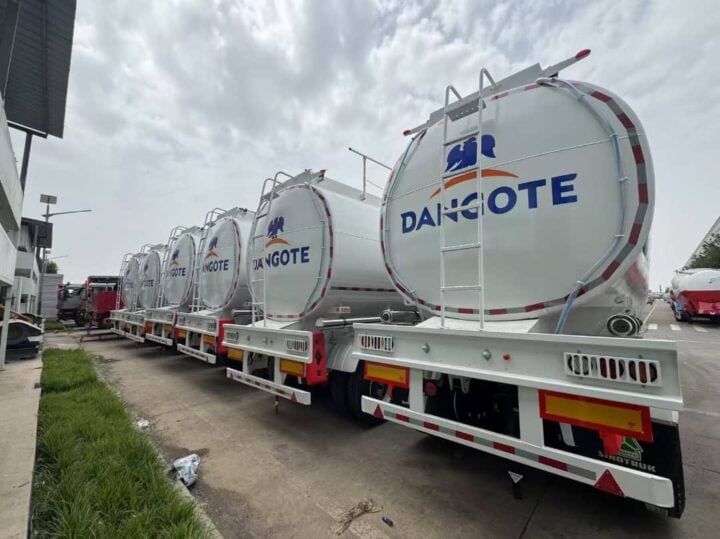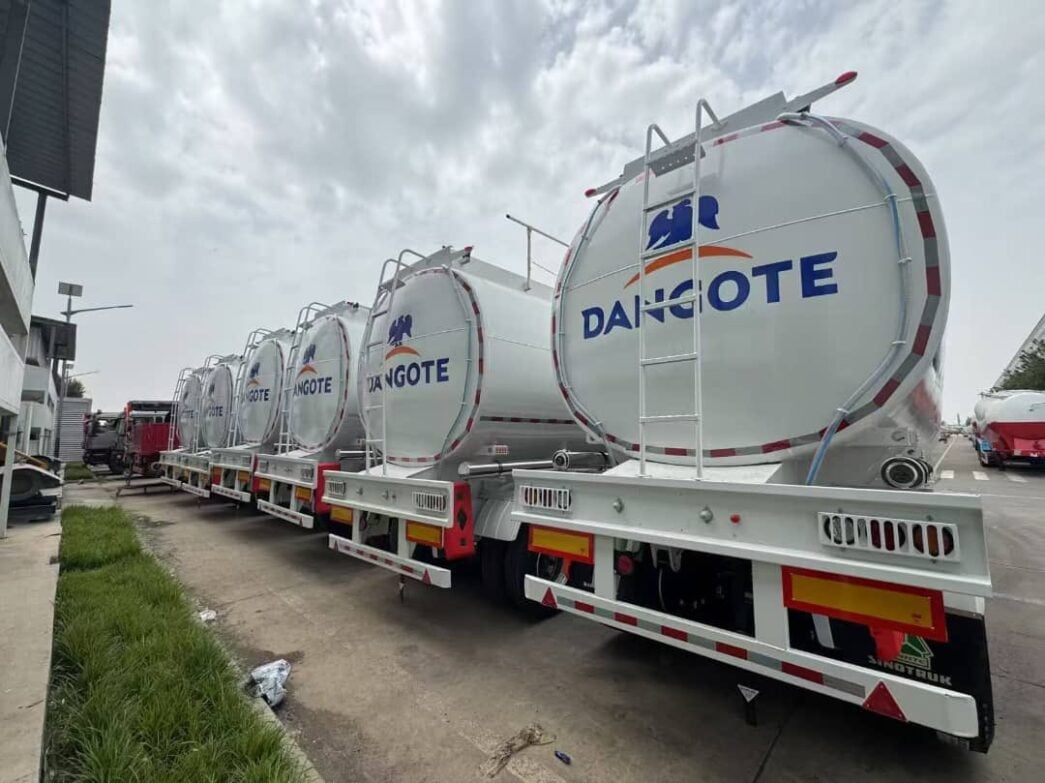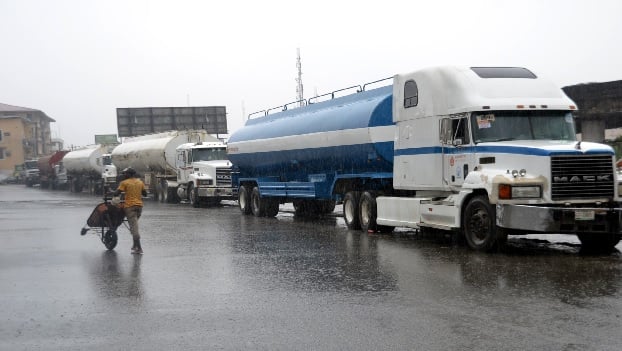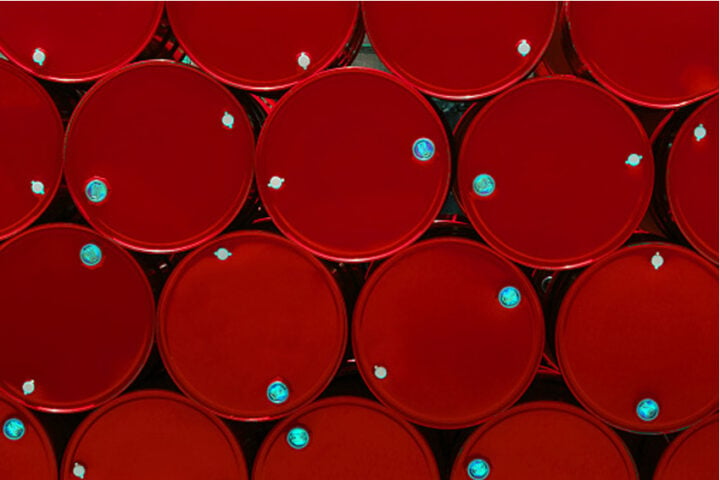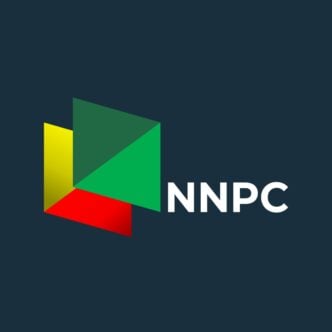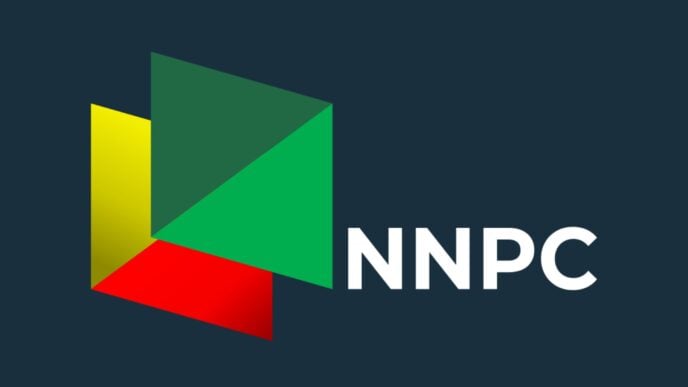As oil marketers devise strategies in response to the fuel distribution plan by Dangote Petroleum Refinery, energy experts have told TheCable that the decision by the refiner is a game-changer and could benefit the end users, but it might negatively impact the downstream sector.
On June 15, Dangote refinery said it would begin the nationwide distribution of diesel and premium motor spirit (PMS), also known as petrol, on August 15.
The refinery also said it had acquired 4,000 new compressed natural gas (CNG)-powered tankers to enhance its fuel distribution capacity across the country.
Following the development, the Petroleum Products Retail Outlets Owners Association of Nigeria (PETROAN) said the Dangote refinery’s forward integration adoption could lead to a monopoly in disguise, also posing a significant job loss threat to Nigeria.
Advertisement
‘GAMECHANGER FOR DOWNSTREAM SECTOR’
Ayodele Oni, partner at Bloomfield Law Practice, said the move by the plant is a game-changer in Nigeria’s petroleum downstream sector.
“For the first time, the Dangote refinery is not just producing fuel (PMS, AGO etc) but it is taking control of distribution across the country,” he said.
Advertisement
Oni said the use of 4,000 brand-new CNG-powered tankers shows Dangote’s readiness to bypass traditional depot networks and reach end users directly.
Once operational, the energy lawyer explained, the distribution will address two significant challenges in the downstream sector: frequent fuel tanker accidents and strike threats from petroleum tanker drivers.
“Another notable advantage of this distribution is that marketers get to save costs,” Oni said.
“While in the typical downstream value chain, transportation costs are passed down to marketers, depot owners, and ultimately to consumers at the pump, with Dangote covering that logistics cost and offering free distribution, marketers will save significantly, and some of that benefit may trickle down to lower or more stable pump prices, especially important during a time of global oil volatility.”
Advertisement
Additionally, he said the deployment of CNG-powered trucks and CNG daughter stations, which support cleaner energy use and decarbonisation of road transport, will help meet both national and global climate goals.
Oni noted that it could be positive news for petrol marketers, as direct distribution offers an opportunity to cut delivery costs while ensuring a stable petrol supply, even amidst the recent volatility in global oil markets caused by the Israel-Iran conflict.
However, he said it is natural that the “relevance of private depot owners may feel threatened in the downstream sector”.
“This is because depot owners rely on their role as distributors of PMS in the downstream sector of the industry to create revenue, as well as to create jobs for tank drivers,” Oni said.
Advertisement
“The depot owners charge significant premiums for storage and distribution.”
Rather than opposing Dangote refinery’s distribution, he advised marketers to study how other countries have deregulated their petroleum sectors to encourage competition between refiners and independent distributors.
Advertisement
WILL THERE BE JOB LOSSES OR NOT?
Speaking on the potential impact of the development on jobs, the energy lawyer said the distribution may not necessarily create a loss of jobs.
Advertisement
“In other countries like Canada, refiners act as distributors of their petroleum products, and the independent distributors are in strong competitive spaces,” he said.
PETROAN had said the introduction of 4,000 new CNG-powered tankers by Dangote refinery may pose a significant threat to the livelihoods of thousands of truck drivers and owners.
Advertisement
However, Oni said the new initiative could upscale competition in the industry whereby depot owners could reduce the prices of imported petrol “to compete, and/or liaise with Dangote refinery to distribute locally refined PMS products”.
On his part, Jide Pratt, country manager of Tradegrid, expressing a dissenting view, said the refinery’s scheme portends “a number of job losses as well as assets going fallow”.
“This is a massive disruptor to the industry from a point of view of businesses already in the space,” he said.
“For other stakeholders in the sector, it will be a massive threat based on the scale of the super refinery. It also challenges the integrated supply model they have from depots to trucks and to retail outlets. This means those who can’t compete will likely go out of business, sadly.”
Pratt emphasised that if the regulator fails to properly manage the refinery’s market share, it could create a scenario where the refinery gains an undue advantage in the market.
He said it could result in a 60 to 70 percent market control, leading to anti-competitive practices, which is ideally what the Petroleum Industry Act (PIA) is designed to prevent.
“Without a doubt, if companies fold up, then job losses will be rife,” he said
‘REFINERIES AS LICENSED DISTRIBUTORS IN NIGERIA’
Speaking further on whether refineries can be licensed to become distributors in the Nigerian market, Pratt said a refinery can get a licence under a special purpose vehicle (SPV) to integrate its supply chain.
“However, the point is if it creates an under-market advantage and stifles competition, in that case it may be counterproductive,” he said.
Pratt also said large refineries, due to their capacity, can influence the retail prices of petroleum products.
“However, most often they focus on coastal trading via vessels and drive a crack spread; they also guarantee quality and volumes. Globally, a bunch of refineries stay on refining and coastal sales as against gantry,” he said.
In addition, Oni said that with Nigeria’s recent transition into a deregulated petroleum market in October 2024, a refinery can sell deregulated products directly to marketers on a willing buyer, willing seller basis.
“Also, following the end of NNPC’s exclusive purchase agreement with Dangote refinery and the Nigerian government’s press release on October 11, 2024, petroleum product marketers can now purchase petrol directly from local refineries. PMS is a deregulated product, and Dangote refineries can become a distributor,” he said.
Speaking further, Oni said some refineries in Canada, Pakistan, Australia, and Kuwait have established a significant retail network, signifying that Dangote’s planned expansion is a common practice in other parts of the world.
‘PRICE EQUALISATION ACROSS NIGERIA’
Also speaking, Muda Yusuf, the chief executive officer (CEO) of the Centre for the Promotion of Private Enterprise (CPPE), said the proposition would benefit consumers who are outside Lagos and “currently paying a premium for additional cost of transportation”.
“Incorporation of logistics into the internal supply chain framework minimises the risk of business disruptions by unionised truck drivers, such as the tanker drivers’ union. It is also good for better safety protocols in the transportation of petroleum products,” he said.
“There are serious safety concerns around the transportation of petroleum products, especially because the products are highly inflammable. Several petrol tanker accidents had resulted from various degrees of breach of safety protocols by tanker drivers.
“This negligence had led to horrific accidents resulting in the loss of several lives and the destruction of properties, often without any compensation.”
Yusuf said the factors listed are some of the dysfunctions in the fuel transportation ecosystem that the internalisation of supply chains would fix.
